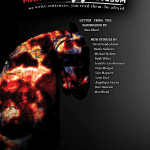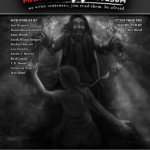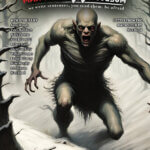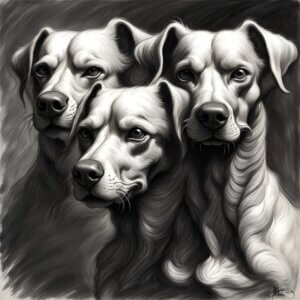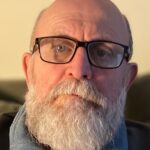At 2 pm, on a searing hot Sunday in July, Kealan stood on the juncture of 59th and 5th and took refuge under the thick branches of a Museum Mile tree as the sun cooked the leaves above.
He took a last swig of his coffee and disposed of the cup in a trashcan. Next, he checked his shoelaces were tied tight, thumbed at his Fitbit, and, keeping to the shade, walked into Central Park.
A long painted black brushstroke that weaved through a thickness of green and blue, the serene Loop stretched on. He inhaled and enjoyed the aroma. Damn, it smelled good here. Like a spray of honey: sugar and sweet, masking the scent of the city. Kealan would walk six miles (6.2, precisely, he knew). The same trip he made every day, or as near as he could manage. Counterclockwise, past joggers and cyclists and electronic scooters and tourists. His footfalls measured the seconds to the steady beat of electronica beating through his headphones, propelling him onward and through.
Kealan merged into the footpath that ran along the length of the road on his left. This was a busy time of day- legions of the super-fit congregating in the city’s heart. Crowds of runners darted past him and ahead, attired similarly in headphones and sneakers, striking their toes against the tarmac. A young woman snaked past him now, her long black hair bobbing behind her, a cell phone strapped to her arm. She followed two men and another woman, with other joggers sure to follow. They each wore identical t‑shirts, identifying them as marathoners in training. He willed them luck. Cyclists overtook them and raced, lapped by couriers on e‑bikes darting to deliver to some hungry New Yorker elsewhere.
He thought of his route. From his Eastside entrance, he’d march upwards past the ducks and water fountains of Jacqueline Kennedy Reservoir. By the third mile, his legs would feel the effort, which would be work. By the fourth, Kealan would walk downhill around the death-bend snake that laced the North Woods by Harlem Meer. More than one cyclist had met their end there, he knew, their skin still grazing lengths of the road where they fell. He’d proceed with caution here. He’d promised Sydney he’d be careful. Then back down, past Tavern on the Green (which reminded him to check reservations for the following weekend, he’d promised Syd). By now, those all-natural endorphins made the remainder of this journey effortless, even enjoyable. Propelled on by whatever equivalent to a runner’s high rewarded the long-walker. Then he’d go beyond Literary Avenue and its jazz bands and tourists. The Boathouse restaurant and its oasis. The young lovers on Kayaks who pedaled away the afternoon (again, he’d check for Syd. A reservation here less likely this time of year, but he’d promised nonetheless).
Eventually, the park would deposit him back where he started. His muscles aching, sweat soaking his clothes, and sunscreen simmering on his skin. A blister or two on his newly calloused feet.
If he kept up the pace, the route would take him two hours. Another twenty minutes additional if he broke away for another coffee on Columbus. But he’d have enough left in his reserves for more should he choose to walk further. His stamina was improving, too. This was so much better than coke.
He reached behind his sunglasses and swiped away rivulets of lotion that matted his eyelids. Reaching behind his ears, he pushed the frames’ metal legs downwards, slotting them snugly into place before his sweat could loosen their grip against his skin. Through his lenses, he saw the pattered shadows tree branches made, shimmering on the surface below.
Kealan was nearing his third month of these near-daily excursions, and now he was approaching his ninetieth day of new health and resolution. And he felt great. And Syd asked him if they could celebrate his newfound will and extra stamina. Things were looking up, he knew. He would outpace the devil yet.
Not that I have any right to, he thought, the idea intruding into his mind like a wasp sting. Not really. Not yet. Because she didn’t just want to celebrate his new commitment to fitness, did she? She’d asked for his sobriety. She hoped to reaffirm his direction, that until recently, had taken acute right-angled turns up whichever nostril was least likely to bleed from his brain. Hell, he suspected she even wanted to mark the occasion to convince herself he’d made it: one month reconciled, 30 days of promises kept.
Reconciled, but not yet mended. Back from the brink of oblivion, at least.
After they split, they exchanged sporadic texts.
“You don’t even know what you looked like,” she wrote. “Your skin was red. Your eyes were bloodshot and bulging. Your fucking nose was running, Kealan. It wasn’t even 9 am, and you were grinding your teeth at me already.”
Yeah, he’d broken her heart, he knew. He must have because his own had cleaved in two. And she’d been right. He’d been high all night. He didn’t try to argue. Instead, he resigned himself to the demise of their relationship and agreed. Kealan hadn’t just been high. He’d been wasted. But then:
“Kick it, and we’ll talk. Entirely. No more coke ever again. I can’t go through this again. I don’t want to find you ODd on fentanyl or meth or whatever else gets mixed. But I don’t want to hear from you for a few weeks, even if you do. And I don’t know where we’ll go from there. I love you, but I can’t watch this anymore.”
Had he been that bad? Was this right? Was she overreacting? Should he tell her that just the week prior, he’d gone without with ease? He’d been about to say so, his finger hovering over “send,” when he realized she’d see this for the bargaining it was.
“Don’t do it for me. This needs to be for you.”
And that, too, was fair. What was unfair was placing the responsibility on her in the first place. She shouldn’t have to break Kealan apart to put him back together again.
“I know she shouldn’t,” he said out loud as a woman jogged by. He shuddered as she frowned and swerved by him to avoid his mutterings. He shook off his embarrassment and quickened his pace. Things were looking up, he knew, oh yes, they were. He had Sydney back now, and all he had to do to sustain this was to keep walking on. Every day. Or as near to daily as his burning calves would allow.
He had replaced one addiction with another, this much he knew. The exercise bowling the pins of his old cravings away. At first, he didn’t miss the cocaine at all. Hell, he didn’t even miss Sydney; those early empty days instead sprinkled with relief. That had changed by the end of the first week as he realized their text messages were not returning, their easy conversation dust, their in-jokes absent and forgotten for good. Replaced by the slow sinking quicksand of boredom and daily morning breakdowns in the shower, overwhelming him with dread and pain as the last of his confidence bled down the sink and away.
So he started walking: one foot in front of the other, heedless of his destination. As he persisted, he learned to ignore the chafing of his nipples against his t‑shirt and the cramps in his feet. Two miles a day, then four, until he’d walked the entire route. After this accomplishment, he bought a new pair of aviators to celebrate (so much better than coke)- the same black sunglasses he wore now, his polarized lenses twinkling in the sunlight.
Moreover, he realized he was even enjoying the walk by then, too. He was becoming irritable when he didn’t get his steps in. Guilt at the lost opportunity to listen to the steady drone of the crickets in between blasts of audiobook or music. Alone with his reverie. Unhappy thoughts intruding with less frequency, replaced instead nostalgic thoughts of lazy (coked out) weekends with Sydney and their sex and sitcoms and (cocaine fueled) concerts in the villages.
Stop thinking about coke, he commanded to himself.
A bald, muscular man skated by on rollerblades. The man leaned forward, his face upturned, and nodded to Kealan as he wheeled past. His hands were clasping something behind his back that Kealan knew to be a water bottle, the same container the man clutched every day as he sped.
There was a pact here among the people of the loop, Kealan knew. An unspoken agreement between the familiar faces he encountered, a silent understanding between Olympian strangers who glanced at each other with encouraging gestures. Kealan had become one of them, and the feeling made him grin. Things were looking up, oh yes.
He noticed another of these assumed kin as he continued. A blond woman, rail thin, stood alone and unmoving like a totem pole planted outside the safety of the footpath. Kealan quickened his pace to pass her rather than risk trailing in her wake at an uncomfortably close distance. She held her head up, stretched high on her neck. Her face tilted towards the sun, tendons thin and taught on her throat. Overtaking her, he saw her eyes were open wide as she gawped into the empty sky. She wasn’t wearing sunglasses. She didn’t blink.
At first, he thought she was staring directly into the sun. But this wasn’t exactly right: instead, she looked at an empty sky overhead.
Tempted to caution her back into the footpath (the day busy, the cyclists reckless), he moved closer. Her lips were moving, muttering some litany offered to vast open space. The woman was painfully skinny.
He walked on.
Still, with a small measure of concern, Kealan called back behind him: “Get some shades! You’ll burn your eyes in this heat.” The woman offered no response. Instead, she continued to stare above her as she mumbled.
By the time Kealan had walked another thousand feet, the stinging in his eyes had become intolerable as his thick application of sunscreen melted down his skin. He tried to blink the cream away, letting his tears run along his cheek, washing away the burn. But this blurred his vision, so he reached to his nose, lifted the glasses, and ran his index finger along his eyelid.
As he wiped, an absurdity crawled up in his mind without context or sense and took root. An insect-like set of chattering nonsense buzzing in his head. The idea grew like mold from his subconscious and became rigid as it subsumed him like he’d plunged into an abandoned well. His thoughts slipped against its damp, moss-covered depths and tried to climb free as cold backward-bent legs crawled over his exposed skin (his skin?), into the holes of his nose and mouth (his mouth?), while he drowned at the bottom below in deep, dank water.
Kealan felt a vibration against his leg. His sunglasses fell back onto the bridge of his nose.
Sydney.
The feeling collapsed as he became aware of her tug at his attention. He checked Sydney’s text.
“Kealan still goes out and walks like 6 miles a day in this heat. I just can’t!”
What had happened to him just now? At best, his head was hazy. At worst he felt like he was stoned on cheap weed. As if his thoughts had been rent up from his mind and released to float away. He’d taken care to hydrate before he took his coffee- was he stroking out in the heat?
“Was that meant for me?” he texted back. In the corner of his ancient cellphone, he saw his battery diminish to ten percent. A blink later, and it read nine. It wouldn’t live long.
“Hah, no, for my sister. Because you’re crazy. She’s telling me how her dogs are coping in the heat.”
Perhaps he had been pushing himself too hard recently?
“I’ll be home soon,” he replied.
Kealan walked on, resolving to drink until he quenched at the next water fountain he reached. He knew the location of each.
His slope was starting to ascend, and as he climbed, his unease made way for uncanny fear. A crowd of three had gathered around a figure familiar to him, who’d collapsed on the ground by a crosswalk that introduced the next turn. One of the skater’s arms bent backward at the elbow, and a hip lay flat, bent at an impossible right angle to the other. The man was unmoving. His helmet remained fastened to his head, his skull protected from the blow, at least. But his face was a gash of blood; his cheek degloved against the surface of the road below.
Two of the three had stood their bicycles horizontally between the park and the accident, slowing incoming riders who took care to avoid them.
“What happened?” Keelan asked the third: a young long-haired man whose obedient dog stayed heeled on its leash.
“I don’t know. Somebody didn’t obey the rules and knocked him clean off his skates. It’s a hit and run.”
A crowd was beginning to gather now. Spectators rummaged for their phones to dial emergency services (rather than video the scene, he hoped).
“Has someone called an ambulance already?” Kealan asked the younger man.
“Yeah, we all did.”
There wasn’t very much Kealan could do. That much was clear. The hero of this scene’s story would identify themselves, organize the onlooker’s response, and give the appropriate statements to the police without him. But he had terms with the victim: two strangers who passed each other during their routines. Kealan paced toward him and knelt to confer with a woman crouched by the skater’s head. She stretched her hand out and placed her fingers on his broken shoulder.
“He alive, yeah?”
“I’d say so,” she replied, “I mean, look at his eyes.”
And this was strange because while he lay shattered on the ground, the skater’s lips were moving. He was mumbling something soundlessly- a pattern too measured to be random but silent all the same, not quite forming words. His eyes weren’t just open, either, Kealan saw. They were peering from the corner of his eyelids and up, bulging as far as they could toward the sky. Past everyone around him and beyond, at something high above them.
“What is he looking at?” Keelan asked the woman.
“I…” she began to reply before lifting her hands to gesture her bewilderment. Through their sunglasses, Kealan and the woman followed the injured man’s gaze. The sun’s persistent glare met them in return.
Behind them, Keelan became aware of a commotion through the tree line. A group of women stood on trampolines. He’d seen them before, half leaping, half dancing to the club-friendly hip-hop broadcast by their instructor’s stereo as they burned the afternoon away. Their workout had taken a pause, and several women were dismounting their boards and approaching one of their number who stood rigid and unmoving beside them. Two other women, spectators of the group, were still, too, heads tilted back, peering into the sky.
Something is happening, Kealan thought. Something terrible, and it’s starting right now.
Kealan broke away from the group and turned back the way he came. He was two miles from home, and it would take forty minutes to return to Syd. Knowing his fear was likely just an altogether predictable consequence of a protracted withdrawal, at the very least, he could check the local news to catch up on the skater later.
A young woman was clutching at the sleeve of her partner’s t‑shirt.
“Paul, Paul, what is it?” she pleaded. The man’s legs had taken root on the asphalt, his shadow frozen behind him. Like the workout group and the crash victim, he stared at the sky. His eyes were wide, his mouth lolling, lips twitching and imbecilic.
“What’s wrong with him?” he asked the woman as she tugged at the man.
“I don’t know, he just stopped moving, and now he won’t…”
The woman trailed off mid-sentence. She, too, had lifted her head to follow her partner above the skyline. Then she was gone, her mouth working in that same mindless motion as the others. Looking back at Paul, Kealan saw a dark wet stain swell in his shorts. He was wetting himself, urine pooling into his sneakers.
Let me tell you a story, Sydney, Kealan began to think.
Kealan left them there to drink in the open sky agog. He walked back down through the turning to the long straight that ran past the reservoir, looped downhill, coiling around the boathouse restaurant and home. A broad view of his future struck out along the next thousand feet. A straight shot along East Drive where the footpath belonged to the runners and police lay their speed traps after dark.
He saw people. Nine figures altogether, propelling themselves on as before. A rush of tour-de-France enthusiasts rode through them, a blur of motion in the heat’s haze. But were all the runners moving? No, some of the runners, three, stood still. Kealan felt bizarre frustration that they’d stopped despite his concern. The man closest to Kealan leaned over, adjusted his footwear, and began to hop before breaking away into a run. The others were too far away to see in any real detail.
He made his way onto a separate footpath to his left, under branches thick enough to block the sun, and merged into the shade. Dotted lengthwise, park benches adorned with gold-plated dedications memorialized lovers of years past and present. Ten thousand dollars each, these missives cost, he knew, and what a lovely surprise that might be for Sydney to re-affirm their togetherness after his collapse. “Sydney and Kealan- 2018 — 20??” he’d print. “Things are looking up, oh yes.”
A memento to mark the time we had together, he thought. Because the world is ending, Syd. Not with a bang, barely even a whimper. It’s not climate change or nuclear war or pestilence or plague. The sky isn’t on fire. Go look out the window and see for yourself.
When he reached the third batch of benches, he found the family. A boy, a girl, and their young mother sat vacant, made empty by whatever had deleted their minds. The boy held an ice cream cone. Vanilla and rainbow-colored sprinkles smeared his lips. The rest melted along his arm, dripping onto his leg and down, forming a curdled puddle below his hanging legs. Standing in front and facing him, his sister’s thin hair hung over her face like a spider’s silk as she lollygagged upwards into the leaves. Their mother sat pinned upright against the back of the bench. In her hand, she held a leash. Hiding behind her legs, the family’s furtive dog cowered.
“Is there anything the matter?” Peter asked the woman. He waved his hand in front of her eyes. No response. He snapped his fingers, once, twice. She gazed witlessly above her, as did her children beside her.
They weren’t pale, like Kealan. South American?
“Estas Bien?”
Again, no response. The woman’s mouth twitched at the corners.
“Ça va?”
His linguistic skill exhausted, he fished his phone from his pocket. After looking around to make sure nobody was peering his way (becoming aware that nearby, more human gravestones were rooted to the ground like stone now), he took a photograph of the group. The battery indicator on his phone mocked him at five percent.
He messaged Sydney the image. “Don’t go outside. I’m on my way home.” The phone sounded a ping as the texts delivered, and his battery showed four. “It’s like they’re stuck. They don’t move. There was an accident too.”
A smell was coming from the woman now.
“My battery is about to die. I know this doesn’t make much sense but see what you can find on TV, and I’ll be home soon.”
Whatever the woman had eaten for lunch that day was vacating her bowels, he realized. The stench was immediate and sickening, worsened in the heat. He was inhaling her shit. What was wrong with these people?
The Hudson isn’t rising from the shallows of the bay to level Gotham. Those aren’t the bells of doomsayers you’re hearing ringing from the shores of Coney Island. Cthulhu doesn’t come. And those towers so high billionaires could reach the sky if their elevators didn’t break down- they can stroke the heavens all they like. It turns out the gods don’t give a shit.
He thought of the skater’s cracked teeth. He was coming up to the thin blond woman again. She swayed upright as if hooked by an invisible puppeteer.
“What’s wrong with her?”
Kealan turned around. A familiar runner- the woman from the crash, panted and frowned through her sunglasses. Had she been sprinting? He hadn’t heard her footsteps.
“I don’t know,” Kealan said.
“I saw you at the accident.”
“Yeah. Did the ambulance arrive?” Kealan asked.
“No. I just came from there. I saw you and tried to catch up with you. But you stopped, and I thought it was happening to you too.”
A cry, loud and shrill, came from the walls of the city. The sound was answered by a loud crack of metal colliding with concrete, then became the sustained drone of a car’s horn.
The jogger flinched, her shoulders raising to swallow her neck, and they both looked toward the street as a rail of smoke started to billow overhead.
“Oh, Jesus. What the hell is wrong with everyone?” Kealan asked.
“I don’t know, but it’s not just them. Back there, it’s all of them. They’re all frozen, just like her.”
“All of them?”
“One by one. At first, I thought they’d been electrocuted. But it’s more like they’ve been switched off or rebooted. I don’t know if you’re supposed to touch someone if they’re in shock, but I tried shaking someone.”
Kealan looked behind them, past the family, past the thin woman. In the straight of road ahead, nobody was moving anymore.
“She just keeled over. She just kept looking at the sky, and she keeled right over.”
Kealan looked back to the statuesque woman beside them. Her eyes had rolled into their sockets, giving her sunken face an ancient, dead look. He reached forward and, as if worried she’d spring to life at his touch, applied the gentlest pressure on her shoulder. She fell backward and hit the ground with a hollow clunk. Her eyes fell with her, remaining locked on something Kealan couldn’t see.
“Just like that,” the runner said.
“But why not us? Why hasn’t it happened to us?
“Honestly, I was hoping you’d know,” she said. Of course, she knew as much as he did. And damn it, why hadn’t Sydney replied yet? End of the world, Syd. Blink, and you’ll miss it. His head was swimming. He raised his hand to his temples and tried to rub away the headache forming in the center of his skull.
“I need to call my husband, but this part of the park is a dead zone,” the woman said, dovetailing into his thoughts. And this would have been correct had they still been standing on the S‑bend, cradling the broken skater with the crowd of onlookers, who, according to this new acquaintance, were now all mindless and gawping at the sky. But his messages to Sydney had gotten through, at least, Kealan realized. He hadn’t seen his texts turn telltale green from blue.
“No, it’s clearer where we are now. Can you check the news?” Kealan asked. She started tapping her fingernails on her screen.
“Oh goddamn it, these lenses,” she said as she pulled her sunglasses from her head. She’d been crying, he saw. “The glasses are too much if I try to make it more like before.”
“What?” Kealan asked her. Because that hadn’t made sense: some confusion of aphasia had just turned her vocabulary into soup. He couldn’t make out the rest of her words, as there weren’t any, not anymore. A flash of scared understanding lit her eyes, and then this, too, was taken from her. She lifted her head upwards and stared as a realization of Kealan’s own began to coalesce within him.
It’s the sunglasses. It happened as she pulled off her sunglasses.
Except that wasn’t right either, not entirely. Because of the people he’d seen, hadn’t they been wearing sunglasses, too?
The mother on the bench. The man and woman by the scene. Both of them, he was sure. The fallen woman and the skater? If not them, then what was it? He looked at the woman, just evaporated, and saw she still held her lenses close to her face. He could now see the tiny letter “p” engraved in the corner of her frames.
Then he knew what it was. The odd thing that had pulled him from that awful feeling, the feeling that submerged him when he lifted his own glasses to rub the sunscreen from his eyes. The feeling that emptied Kealan out and tried to drown what remained of him in its mire.
Both of their sunglasses were polarized.
He didn’t know the ‘why’ of it. But somehow, the glare-reducing chemical filter painted onto the lenses of his Aviators had saved him. As had this woman’s pair shielded her until she took them off and unraveled away.
One percent remained left on his phone’s battery. He typed to Sydney, his thumb shaking: “FIND YOUR SUNGLASSES AND DON’T TAKE THEM OFF FOR ANYTHING.”
He tapped send. Then the phone was broken metal. The sun reflected off its cracked black glass.
From her slackened grip, he took the woman’s sunglasses and hung them on the neck of his t‑shirt. He’d give these to Sydney because he couldn’t remember if her glasses were polarized like these.
At least we’ll look fashionable as the world ends, in our cabin in the woods. Or our conclave or the safety of our uncle’s farm or wherever we decide to ride this out, if we survive that long. Fretting if our new neighbors agree on the best way to plant corn over a weathered copy of the Farmers Almanac. Barbed wire circling the perimeter. Town-hall meetings scheduled to discuss next week’s raid.
It maddened him that he couldn’t remember. He’d know soon enough. As he hurried home to the horror he dreaded awaited him there, Kealan came upon pockets of carnage, like stills edited together from different films curated from the same theme. Each scene encapsulating a further tragedy.
A kayak had lay capsized in the lake. Its oar trailed the upturned hull. Two people bobbed, drowned in the water behind it. Kealan had taken Syd on one of these rides last summer. She’d thrown up on the lake, made sick by the current.
He found a police car embedded in a tree. Smoke rose from its bonnet in thin grey wisps, and a small animal lay crushed under the back wheel. Kealan thought it might be a raccoon. The cop’s head merged with the steering wheel, and blood wet his uniform. His eyes were closed: a mercy. Through the smashed driver window, he lifted the radio receiver and clicked. Static drifted in reply. A fire began to crackle from the bonnet, so Kealan hastened away. He made it one hundred feet, and the car ignited behind him.
He followed a dented mess of vehicles to his home street. The cars lay crushed together in their collision like some multi-headed hydra cast in iron. Almost home now- things were looking up, oh yes, they were.
He didn’t need to unlock his apartment door. Hearing him in the hallway outside, Sydney had already opened it. She stood shaking in the entrance and stammered his name. Her sunglasses were tight against her face, and she pulled him inside.
“What’s happening?” she cried as he drew her into him. “What’s happening? What’s happening? What’s happening?”
Behind her on the television, a newscaster sat with his expression focused elsewhere. The channel’s text chyron rotated below, the headline missing, vacant space burning onto the screen in its absence.
Through the steady white noise of the apartment’s air conditioner, Kealan described to Sydney the thin woman, the accident, and the family. She listened with care and didn’t interrupt or question him. Then Sydney disentangled her fingers from his, walked to the window, and peered through the blinds at the smoldering cars on the street underneath them.
“Do you believe any of that?” he asked her. At first, she didn’t reply. Then she dug between the couch cushions and found the television’s remote.
“Yes. Yes, I do,” she said. She brought the reporter back on the screen. “When I found your text, I did as you asked. This was the first news channel I found. Look at him. He’s drooling. Then I started flicking between them.”
Sydney rotated through the local news stations. On the next channel, the reporter sat still. On the third, a woman lay slumped back in her chair. Sydney paused on the fourth, on a map depicting their screaming hot summer, the weather reporter missing from the screen.
“Can you change the channel back a couple of times?” Kealan asked. The words “EAST COAST COOKS. Heatwave enters fourth week,” blinked into view and scrolled by.
“Look at the headlines,“ Kealan said. “There’s nothing about this, so it happened fast, and they didn’t realize. Everything just stopped.”
“Are they dead?” she asked.
“No. I don’t think so.”
After a beat, Sydney switched to a different channel: “So then I went international. Irish news, look.”
The end of the world had interrupted some talking head roundtable discussion. Suited men and women gawped past each other and up.
“Oh, Christ.”
“BBC knows something’s up.”
She switched to the UK. A famous test card appeared: a child drawing on her chalkboard, looking back at the camera, smiling into yesterday.
“So whatever is happening is everywhere,” she said, “and I can’t find anything online. Social media, Instagram. The last post on my feed was maybe an hour ago.”
Sydney was beginning to sob. She pushed her sunglasses firmly onto the bridge of her nose. Her words became a flood. “The updates just stopped, and I tried texting my sister, and she stopped replying, and I tried texting friends, and nobody’s there anymore, and I think we’re alone.”
“Please keep your glasses on,” Kealan said.
They found a roll of black duct tape among a detritus of home essentials, hidden at the bottom of their hallway closet. String and scissors in the kitchen drawer.
“What if we close our eyes when we take them off?” asked Sydney. “They’re going to itch.”
“Are you willing to risk it?”
“No. Not yet, at least.”
Kealan tore off inches of tape at a time, then cut the material into thin, black strips. As Sydney held them in place, he stuck the tape around the rims of her lenses. Next, he pressed the tape directly onto her skin, sticking them into place. He let no gaps remain to let in the light through anything other than the lenses. Then he took the string and tied each end to the legs of her frames.
“This should keep them secure for now if we don’t sweat. We’ll work a gap into the seal so we can use a straw or something to scratch,” he said.
“Okay,” she said, “maybe we can find goggles that work the same way.”
“Yes. Good idea.”
Next, he repeated the work on himself, using the hallway mirror to guide him. The only light he could see filtered through the lenses.
“Let’s leave the selfies for another day,” he said. Sydney giggled and kissed him.
Their sleep was fitful, but the lenses remained intact through the night. When the morning came, a barking startled them awake: someone’s dog dismayed at their owner’s inattention. Kealan and Sydney then took turns replacing the tape on each other’s frames, making sure they were attached, firm and safe. When it was light, they ventured outside. For their idea, Kealan took the extra pair of sunglasses he’d lifted from the woman in the park.
“Let’s find somewhere with lots of people,” Sydney said.
“Times Square?” Kealan offered, and she agreed.
As they made their way toward midtown, they debated the cause of their apocalypse.
“Climate change? That would be my first guess,” Kealan said. “I mean, we know it’s been getting hotter. Maybe their brains have boiled.”
“It’s been hot for weeks.”
“Maybe some type of radiation? Coming from the sun?”
“But it’s only people. Did you notice? There were birds last night, did you hear them? This morning there was that dog. And I bet you if you retraced your steps in the park, you’d find more dogs, and they’d be fine. If it were global warming, it wouldn’t just be us.”
Kealan thought of the scared animal he’d found under the park bench, cowering in the corner. “We can go look later,” he said.
“This feels like it’s targeted. This is something we’re not seeing,” Sydney concluded.
When they reached 45th Street, they faced a sea of people. Everyone looked skywards as a congregation in prayer. Someone in the thick crowd had fallen and taken dozens to the ground like dominos.
“How long can people survive like this?” Sydney asked. Kealan suspected she already knew but answered all the same.
“Three days.”
They reached a clearing among the crowd and found a woman standing alone. Sydney eyed her head to toe as if appraising her choice of summer wear.
“What are they all looking at?” she asked. With her pointed finger, she traced the woman’s stare upwards to the sky. “They’re all looking at something up there. It isn’t random,” she said.
“Let’s ask her.” Kealan took the spare sunglasses and unfolded the legs. “Are you ready, Syd?”
Sydney nodded, so he slid the legs of the glasses through the woman’s sweat-stained hair until they rested behind her ears. Then he lowered them so they covered her eyes, obscuring her view of whatever lay claim to her above.
The woman started screaming. Her pupils darted back and forth in her head, seeing Kealan, then Sydney, the Kealan again. As she cried, the sound rose from some pit deep inside her, and she lifted her hands to claw at the air between them. On her third scream, something tore in her throat, and her voice became a wheeze. She screamed all the same.
Sydney swiped her hand at the woman’s tortured face. Her fingertips clipped the glasses. They disappeared through the air, lost to the fallen crowd.
The woman stopped screaming an instant later. Her head snapped back like a flower on a broken plant stem, caught in the wind. Then she fell, face forward, and didn’t move again.
They left the dead woman with the rest and returned home. That night, Kealan held Sydney close to him as he skimmed thin sleep.
“Are we the only people left?” Sydney asked.
“There’ll be others.”
“But if it’s the glasses? Really the glasses? Then that leaves blind people and people with ones like these.”
Kealan was sinking away. If they didn’t take them off, he thought.
“Can we try and find my sister tomorrow?”
“Yes.”
Kealan had been relapsing in his dream. Now awake, he could smell ozone burn and thicken the air. Behind the bed’s headboard, the window vibrated in its frame. He kneeled, peering into the night, and saw a tear of yellow lightning separate the stars above Manhattan. It left a zigzag crack like a dagger taken to bleed the sky. An impossible color swirled in the wound, made indistinct by the lenses still taped to his face.
His thoughts were becoming fuzzy as he looked. Like his mind slipped against a surface area that stretched outward and away.
From deep within the sky’s crack came a flash of white, and something large and thin blinked through. Red lights flickered on its black surface. Then it fell free towards the earth. There was another white flash, then another, and the night was full of falling craft.
Kealan reached out to touch his sleeping love beside him. I think I can finish that story now, Syd, the one about the end of the world.
Iain Maguire (he/him) is a short story writer born and raised in Scotland, currently living in New York. In the evening, he is often found taking long walks in Central Park in between coffee refills and bookstore deep-dives. By day he is a software engineer and technical instructor. As an avid fan of horror movies and literature, he endeavors to incorporate elements of his own experiences into his writing. He lives with his partner Kitty, their cat Priscilla, and an ever growing collection of books. He is currently working on his first novel.

